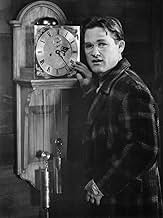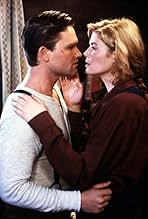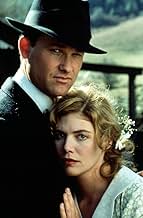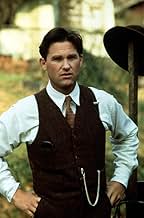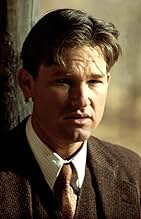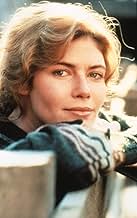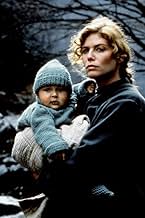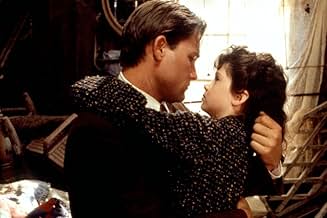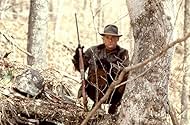IMDb RATING
6.2/10
1.8K
YOUR RATING
In 1930s Appalachia, a widowed city clock maker falls in love with an unwed mother and finds himself in the middle of a long-standing feud between two clans.In 1930s Appalachia, a widowed city clock maker falls in love with an unwed mother and finds himself in the middle of a long-standing feud between two clans.In 1930s Appalachia, a widowed city clock maker falls in love with an unwed mother and finds himself in the middle of a long-standing feud between two clans.
Lucile McIntyre
- Mrs. Crawford
- (as Lucille Dew McIntyre)
- Director
- Writers
- All cast & crew
- Production, box office & more at IMDbPro
Featured reviews
10echurch
This movie was filmed near my hometown in the Western North Carolina mountains in a little community called Plumtree in Avery County. The severe winter weather depicted in the film is like it really is. The elevation here is about 3500 feet and the area gets enough snow to support a large snow skiing industry.
Deceptively marketed as a "Deliverance" retread, it has, in fact, more in common with Peter Weir's "Witness" and Richard Pearce's "Heartland". Kurt Russell plays Wayland Jackson, a humble widower who begins a new life with his daughter in North Carolina. When he meets and falls in love with Collie Wright (Kelly McGilis), he must prove his mettle to her father (Lloyd Bridges) and deal with local animosity towards him.
Director Ted Kotcheff, who also made "First Blood", "Uncommon Valor" and the brilliant "Split Image", a scathing look at a religious sect, brings his considerable experience with personal politics to this well made, beautifully acted, snow-bound drama.
The film's last act is where the violence flares and the stage is set for several bloody, taut altercations. The film, however, never loses sight of its personal story and focuses closely on the courage and resilience of good, honest folk.
John Scott's score is hypnotic.
Director Ted Kotcheff, who also made "First Blood", "Uncommon Valor" and the brilliant "Split Image", a scathing look at a religious sect, brings his considerable experience with personal politics to this well made, beautifully acted, snow-bound drama.
The film's last act is where the violence flares and the stage is set for several bloody, taut altercations. The film, however, never loses sight of its personal story and focuses closely on the courage and resilience of good, honest folk.
John Scott's score is hypnotic.
While I won't go to the hyperbole of this being the best film ever, it is certainly one of the more satisfying. The fact that you can tell a compelling human story without overwhelming the audience with action (and I like action flicks as well as anyone) is noteworthy. It is not your typical story - it's got real conflict, real relationships (both good and bad), and a sense of authenticity that is lacking in many films. The setting is not one that is common, although it would be contemporary with 'To Kill A Mockingbird'. It sheds some light on a part of the country that is not familiar to most of us. It reflects some thought in fleshing out real characters, instead of relying on portraying stereotypical backwoods people. While many of the actors have gone on to other roles, the movie retains the allure of watching real people. It should be considered a high mark in the careers of both Kurt Russell and Kelly McGillis. It is one of those rare movies that I appreciate watching each time.
Widowed clockmaker Kurt Russell brings his daughter, Amelia Burnette, to the Carolina Piedmont. There he falls in love with single mother Kelly McGillis. However, when the baby's drunken father comes calling, the pair of them are forced into desperate action.
The movie is replete with carefully offered symbolism, almost certainly from the novel by John Ehle), mostly about the wintry stasis of people and society during the early stages of the Roosevelt New Deal, to characters' names (I'm reading Scott's KENILWORTH, so Russell's character's name of "Wayland" seems apt), to the way cinematographer Francois Protat lights the shots in a greyness that doesn't break until the end. Ordinarily I would find this sort of movie pompous with its easy-to-analyze details substituting for the things that interest me most: character and story.
This one never does, thanks to a fine cast under a solid director. Ted Kotcheff may be best know for his gross comedy hit WEEKEND WITH BERNIE, but his long resume shows a respectful handling of movies about subcultures: not only THE APPRENTICESHIP OF DUDDY KRAVITZ, but NORTH DALLAS FORTY.
The movie is replete with carefully offered symbolism, almost certainly from the novel by John Ehle), mostly about the wintry stasis of people and society during the early stages of the Roosevelt New Deal, to characters' names (I'm reading Scott's KENILWORTH, so Russell's character's name of "Wayland" seems apt), to the way cinematographer Francois Protat lights the shots in a greyness that doesn't break until the end. Ordinarily I would find this sort of movie pompous with its easy-to-analyze details substituting for the things that interest me most: character and story.
This one never does, thanks to a fine cast under a solid director. Ted Kotcheff may be best know for his gross comedy hit WEEKEND WITH BERNIE, but his long resume shows a respectful handling of movies about subcultures: not only THE APPRENTICESHIP OF DUDDY KRAVITZ, but NORTH DALLAS FORTY.
I live here where they filmed the movie and I thought it was wonderful, the story was a wonderful setting for a romance and I thought the way they met and grew to love one another was outstanding. Even though the murder took place it showed what all they were willing to sacrifice for love. The way the family takes him in as a part of them at the beginning except for one brother and the way he begins to trust him is even as touching. The bear hut I thought was true to life as everyone here has mostly been and the producers and directors kept it true to life. We had a couple of our own hometown folks in the movie, the older men on the porch of the store, added more depth and made us proud. I guess in some ways we are portrayed as "bumpkins" still but I guess in a lot of ways we are and it shows how we live here... or families are all close and loving, never turn our back on our loved ones and I like how the movie shows us.
Did you know
- TriviaThe first film produced by Castle Rock Entertainment.
- GoofsThe bottle of whiskey is noticeably fuller when Wayland picks it up than when Cole drinks from it a moment earlier.
- Quotes
Cole Campbell: C'mon in Ghost, C'mon in.
- ConnectionsFeatured in Siskel & Ebert: They'll Do it Every Time: Part One (1989)
- SoundtracksLightning in a Bottle
Written by Jimmy Webb
Produced by Roscoe Beck (as Charles Roscoe Beck) and Jennifer Warnes
Performed by Jennifer Warnes
Courtesy of White Oak Songs
- How long is Winter People?Powered by Alexa
Details
- Release date
- Country of origin
- Language
- Also known as
- Winter People - Wie ein Blatt im Wind
- Filming locations
- Production companies
- See more company credits at IMDbPro
Box office
- Gross US & Canada
- $2,023,282
- Opening weekend US & Canada
- $743,032
- Apr 16, 1989
- Gross worldwide
- $2,023,282
Contribute to this page
Suggest an edit or add missing content


